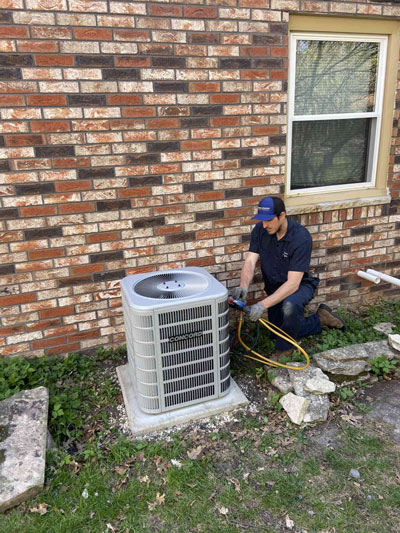When your central air conditioning unit starts acting up, it can be a stressful situation. Do you repair it, or is it time to replace it entirely? Making this decision can be challenging, but this guide will help you weigh your options and find the best course of action for your Wisconsin home.
Understanding the Lifespan of Your AC Unit in Wisconsin
How Long Does an AC Unit Last?
On average, a well-maintained central air conditioning unit lasts about 10-15 years. In Wisconsin, the climate plays a significant role in this lifespan. Harsh winters and hot summers can lead to increased wear and tear on your unit. Factors such as usage frequency during the warmer months, regular maintenance, and the seasonal temperature changes can all influence how long your AC unit will last. By understanding these aspects, you can better decide if a repair or replacement is the right choice for your situation.
Signs You Need a New Air Conditioner
Before deciding to repair or replace your AC unit, look out for these common signs that it might be time for a new one:
- Frequent Repairs: If your unit has needed multiple repairs over the past few years, it might be more cost-effective to replace it.
- High Energy Bills: An aging AC system often works harder to cool your home, leading to higher energy consumption and increased utility bills.
- Inconsistent Cooling: If some rooms in your home are significantly cooler or warmer than others, it could signify that your AC unit is struggling.
- Strange Noises: Unusual sounds like grinding or squealing often mean serious mechanical issues.
- Poor Air Quality: If you notice increased dust or humidity levels in your home, your AC may not be functioning correctly.
- Age of the Unit: If your AC unit is over 10-15 years old, it may be time to consider a replacement, as older units are less efficient.
- Frequent Cycling: If your AC turns on and off more often than normal, it could be a sign of a failing system needing replacement.
Benefits of Repairing Your AC Unit
If your AC unit is relatively new and the issues are minor, repairing it might be the best choice. Here are some benefits of opting for repairs:
- Cost Savings: Repairing your unit is usually less expensive than replacing it, especially if the problem is minor.
- Less Disruption: Repairs typically take less time and are less disruptive to your daily routine than a full replacement.
- Extended Lifespan: Addressing minor issues promptly can extend the life of your AC unit, delaying the need for a costly replacement.
- Environmental Impact: Repairing your air conditioning unit cuts down on waste and lessens the environmental impact of making and disposing of units. Keeping your current unit running longer is a more sustainable choice.
- Familiarity and Comfort: Keeping a familiar system means you won’t have to adjust to new features or interfaces. This consistency helps maintain comfort at home and reduces the learning curve for a new unit.
Benefits of Replacing Your AC Unit
In some cases, replacing your AC unit might be the better choice. Here are some benefits of investing in a new system:
- Energy Efficiency: Newer models are significantly more energy-efficient, which can lead to substantial savings on your energy bills.
- Improved Performance: A new unit will provide more consistent cooling and improved air quality.
- Advanced Features: Modern AC units come with advanced features such as programmable thermostats, smart home integration, and better humidity control.
- Long-Term Savings: While the initial cost is higher, a new unit can save you money in the long run by reducing the need for frequent repairs and lowering energy costs.
6 Steps to Decide Whether to Repair or Replace
Step 1: Assess the Age of Your Unit
Consider the age of your AC unit. If it’s over 10 years old and experiencing significant issues, replacement might be the more practical choice.
Step 2: Evaluate Repair Costs
Compare the cost of repairs to the cost of a new unit. A good rule of thumb is the “5,000 Rule”: Multiply the age of your unit by the repair cost. If the result is more than $5,000, replacement is often the better option.
Step 3: Consider Energy Efficiency
Evaluate your current energy bills. If they’ve been steadily increasing, a more efficient new unit could save you money in the long run.
Step 4: Review Maintenance History
Look at the maintenance history of your unit. If it has needed frequent repairs, it might be more cost-effective to replace it.
Step 5: Check for R-22 Refrigerant
Older AC units often use R-22 refrigerant, which is being phased out due to environmental concerns. If your unit uses R-22, replacing it with a newer model using more eco-friendly refrigerants might be beneficial.
Step 6: Consult with a Professional
Before making a final decision, consult with a professional HVAC technician to get an expert opinion. They can offer valuable insights and help you weigh the pros and cons of repairing versus replacing your unit.
Get Professional Help
Ultimately, the decision to repair or replace your AC unit depends on various factors, including its age, repair history, and overall performance. By carefully considering these aspects and consulting with a professional, you can make an informed decision for what you need and within your budget.
Consider the long-term benefits of investing in a modern system, as newer units often come with warranties that can provide peace of mind. They also tend to require less maintenance, allowing you to focus on enjoying a comfortable home rather than worrying about repairs.
If you still have questions or need professional advice, don’t hesitate to reach out to Donovan & Jorgenson Heating and Cooling for expert help. For more information and to get in touch with our team, visit our Contact Us page. We offer emergency services 24/7 so your home remains comfortable, no matter the situation.






